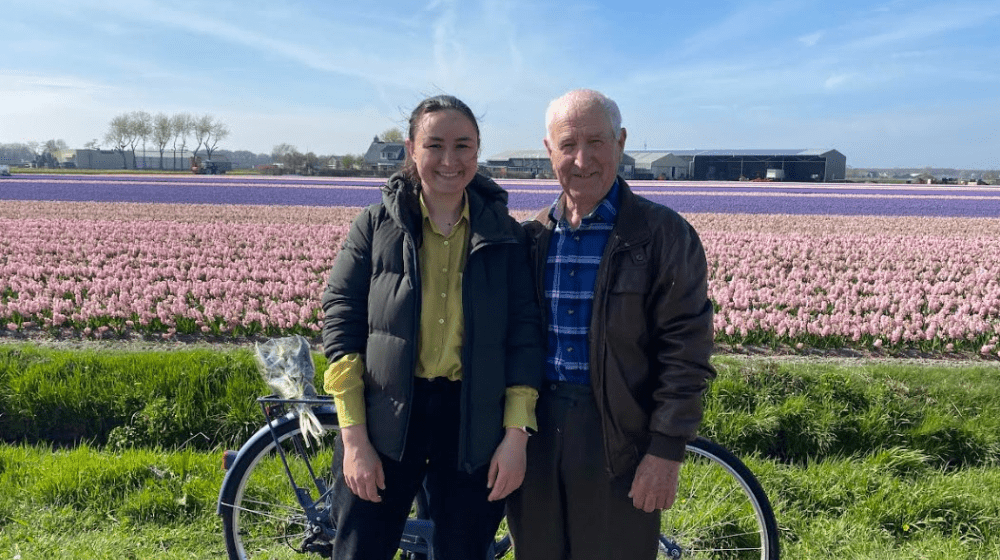Oxana Greadcenco is a Moldovan journalist who has been living in Amsterdam, the Netherlands, for many years. She is managing remotely the website www.moldova.org, a local media company focusing on explanatory journalism.
Beyond her professional role, Oxana is a revered storyteller in her community of over 20,000 followers on Instagram. Many of her stories shared on social media feature her family members – her son, partner, mother, aunt, all residing in Amsterdam, as well as her grandfather with whom she has maintained a special relationship even over thousands of kilometres. How? Thanks to the power of the phone.
Oxana's grandfather, Ion Vengher, is 72 years old. He's an advocate for active ageing – he rides his bicycle and uses the high-performance mobile phone he received as a gift from his daughters. From the very first week, he felt that his life had transformed after learning how to use the phone. All of his children and grandchildren live abroad, and the gadget has bridged the distance – he talks with each of them several times a week.
„I love it when he steps out of the house and shows me through the phone that the strawberries have ripened or how the garden has turned green. It helps me not to feel guilty about being far away. He calls his college friends, relatives from other towns – online communication has made his days more interesting and meaningful”, Oxana shares.
Statistics show a significant digital gap between young and elderly populations in the Republic of Moldova – only 34% of people aged between 60 and 79 have used the Internet, compared to 82% of those aged 15 to 59.
Oxana, along with her family, introduced her grandfather to the world of the Internet. She believes that the youth and the elderly can learn from each other. She thinks that young people should learn to listen more and be present in conversations, as excessive use of phone and technology fragments attention and makes it challenging to focus on a topic or conversation.
„It's a great exercise to listen, to remain present in the discussion, to fuel the conversation with questions and interest. The elderly have all the time in the world and the wisdom to guide us in this process. Our brains, accustomed to other speeds, may protest at first, but they will learn over time to enjoy the process and the treasures that the elderly carry with them”.
The use of mobile phones and social media by the elderly reduces feelings of loneliness, depression, and social isolation, which increase with age, reaching up to 11% at the age of 75-79 compared to less than 1% at the age of 20-24.
„Besides my grandfather who I try to talk to as often as I can, I always try to make friends with older people. If I sense their curiosity, I start the conversations myself. Their life stories and experiences are fascinating. I'm always curious about how they lived their youth, how they felt as parents, what challenges this role brought, how they stay connected to their old passions, and how they discover new ones”, Oxana adds.
Having lived abroad for many years and having had the opportunity to travel and explore several countries, Oxana notices that the elderly in Western European countries have a different lifestyle and a higher quality of life.
„In the West, life expectancy is at least ten years higher than in the Republic of Moldova. It's clear where their zest for life, energy, and curiosity for things and habits that Moldovan seniors can't even imagine come from. It's also related to their financial resources and the security of tomorrow, which unfortunately are foreign to our older people”.
Oxana hopes that as she ages, she will remain as strong and healthy as her grandfather, Ion, so that she stays active both online and offline at the ages of 50, 60, or 70, with enough energy and time for family and friends. She envisions herself writing, developing businesses, and doing sports.
„I dream of seeing elderly people in our villages setting off on long hikes with walking sticks, gathering for tea in the centre of the village, or exercising together at the stadium”, Oxana concludes.
According to statistics, Moldova's population is ageing, with one in four people being over 60 years old. The ageing trend is expected to continue in the coming decades. To respond to these trends, the United Nations Population Fund (UNFPA) is working with the Ministry of Labour and Social Protection of the Republic of Moldova and other partners to implement the 2023-2027 National Program for Active and Healthy Ageing. The program aims at increasing opportunities for active and healthy ageing and thus strengthening the country's demographic resilience.


